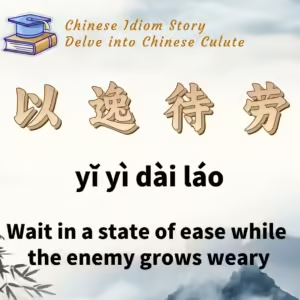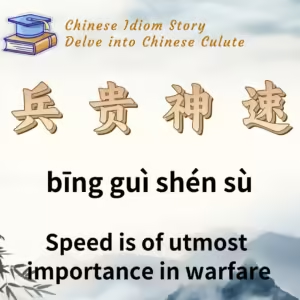
Chinese Idiom: 兵无常势 (Bing Wu Chang Shi)
English Translation: There are no fixed strategies in warfare
pīn yīn: bīng wú cháng shì
Idiom Meaning: This idiom emphasizes that military strategies should be flexible and adapt to the situation and the enemy’s conditions, rather than sticking to rigid rules. It can also apply to other situations where solutions must be tailored to specific circumstances.
Historical Source: From Sunzi’s Art of War, specifically the chapter Xu Shi (虚实), which discusses the principles of using deception and adaptability in warfare.
Idiom Story:
In the chapter Xu Shi of Sunzi’s Art of War, Sun Wu illustrates that just as water takes on various forms, military strategies should not be fixed. He explains that victory comes from being able to adapt to the enemy’s changing conditions, and states: “Therefore, there is no constant shape in warfare, just as water has no constant form. Those who can adapt to the changes in the enemy’s situation to achieve victory are called strategic masters.”
Sun Wu likens military tactics to the five elements (water, fire, wood, metal, earth) and the four seasons, which are always changing and cannot be rigidly defined. He emphasizes that success in warfare depends on adaptability rather than adherence to unchanging methods.
A historical example involves Han Xin, a general during the Han Dynasty. After defeating Wei, he moved to attack Zhao, which was guarded by a large force at a narrow pass called Jingxing. Zhao’s general, Chen Yu, ignored the advice of his strategist, Li Zuo Che, who proposed a clever plan to intercept Han Xin’s supplies, insisting on a traditional strategy instead. Han Xin, learning of Zhao’s plans, camped near the pass, ultimately defeating Zhao’s forces by using a “backwater formation” where his troops fought desperately with no retreat.
When questioned about his unconventional tactics, Han Xin explained that sometimes one must place troops in desperate situations to motivate them to fight fiercely for survival, illustrating that even established military strategies must be adapted to specific circumstances.
This story exemplifies the principle of “兵无常势,” reinforcing the idea that flexibility in military tactics is crucial for success.






